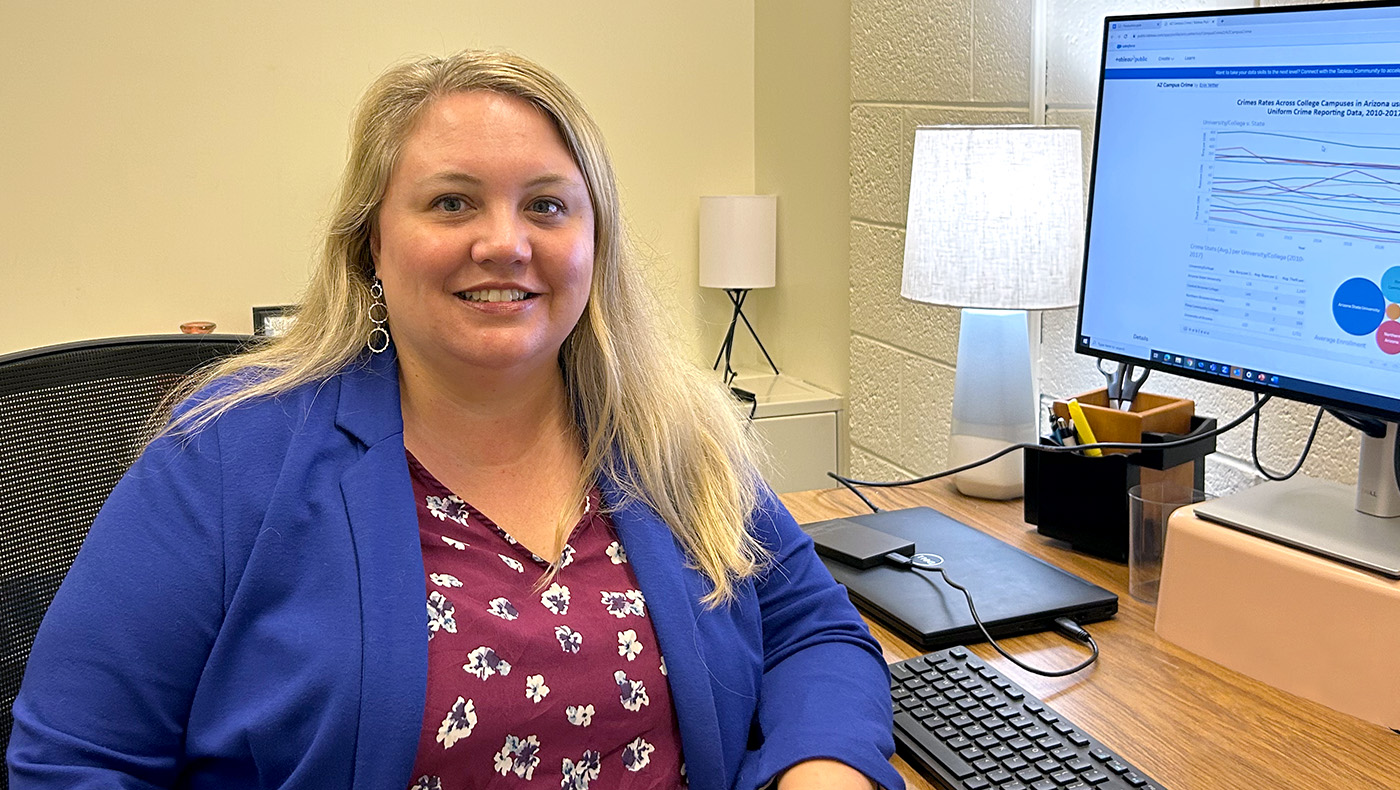When was the last time you crossed a street illegally?
University of Delaware Visiting Assistant Professor of Economics Erin Yetter asks undergraduate students in her Economics of Crime class if they’ve ever jaywalked as she prompts them to consider how they apply economic reasoning in their lives.
Yetter’s new course in the Alfred Lerner College of Business and Economics appeals to students from a wide variety of majors across UD, challenging them to dig into why crime happens, whether our methods of dealing with it work and at what cost, and how economic thinking can provide insight into solutions.
The economics of crime is based on rational choice theory. The idea is that “A criminal only chooses to commit the crime, if the perceived benefit of committing the crime outweighs the perceived cost,” Yetter said.
The topic intersects with many societal issues that dominate public debate, like criminal justice reform, the death penalty, policing and those ever-contentious arguments that pop up around election season about how to be tough on crime.
Students often say they had no idea this field of study existed, Yetter said. In past classes she’s taught on the subject, about half the students tend to be economics majors, and half come from other fields.
“I think that is really cool too, showing them in a more concrete way that economics exists in the real world. It applies, I’ll argue, to everything we do.”
The jaywalking discussion is one way Yetter relates this field of study to her students. They usually don’t consider ducking across the street against a “don’t walk” light a crime, although they might think twice if they were sharing the sidewalk with a campus police officer. Other examples Yetter mentions include shoplifting and driving under the influence.
This might seem like an odd way to talk about crime, which is generally framed in terms of right and wrong, not whether it will benefit someone. But while the ideas can seem counterintuitive, this is the lens economists use to analyze how anti-crime policies work, and importantly, whether they’ll backfire. If the goal is to prevent bribery, for example, will a given law actually do it?
Some laws seem to make obvious sense, but when considered from this cost and benefit perspective, they may actually motivate people to commit crime.
Yetter pointed to “three strikes and you’re out” policies that levy heavy sentences like life imprisonment if someone is convicted a third time. The idea is to use dire punishment to deter habitual criminals.
One study, she said, shows that this policy actually increases murders, because people with two “strikes” are motivated to kill witnesses so that they can avoid the harsh consequences.
Analysis in Italy, Yetter said, found that incentives to get police officers to stop accepting bribes from the mafia worked. “The police officers stopped taking bribes … but then what in turn happened is because they weren’t taking the bribes, the mafia just killed them.” This obviously was not what reformers had in mind.
Take a third example: The “ban the box” movement, which aims to stop employers from asking about criminal history on job applications. The hope is that we can give reformed former prisoners a new chance at life, instead of stigmatizing them over past mistakes.
But, it actually increased discrimination, Yetter said, because employers tried to guess whether someone had a past record based on sometimes very discriminatory cues like skin color.
It points to how difficult public policy is, Yetter said, because “You can’t think of everything” when writing laws, and sometimes the things you think least likely to happen, do.
If the original idea isn’t working, the question then is how to achieve those goals. Her students take a stab at ideas to create better laws. Some of the proposals aren’t feasible, but “some of the things they come up with are just beautiful, like ‘Wow, we should try this, write to your senator,’” Yetter said.
Understanding the economic way of thinking can give practical insights into ideas people will encounter as citizens. For example, the idea of bolstering police numbers comes up, Yetter said, when people are trying to get reelected and want to look tough on crime.
“Does hiring more police officers reduce the crime rate? And the answer is no; in general, it does not,” Yetter said. Although there are exceptions, it tends to be very costly and time-consuming without the desired results.
Applying economic ideas can help decide which policy levers to pull to prevent crime, Yetter said. But it’s broader than that.
She hopes students learn new ways of thinking about the benefits and costs of decisions, whether that’s in voting, deciding who to hire if they ever own a business, or something else.
“We make thousands of decisions every single day. And most of them are inconsequential, like my decision to put on this shirt today. But some of them … will affect our lives for years to come.”




